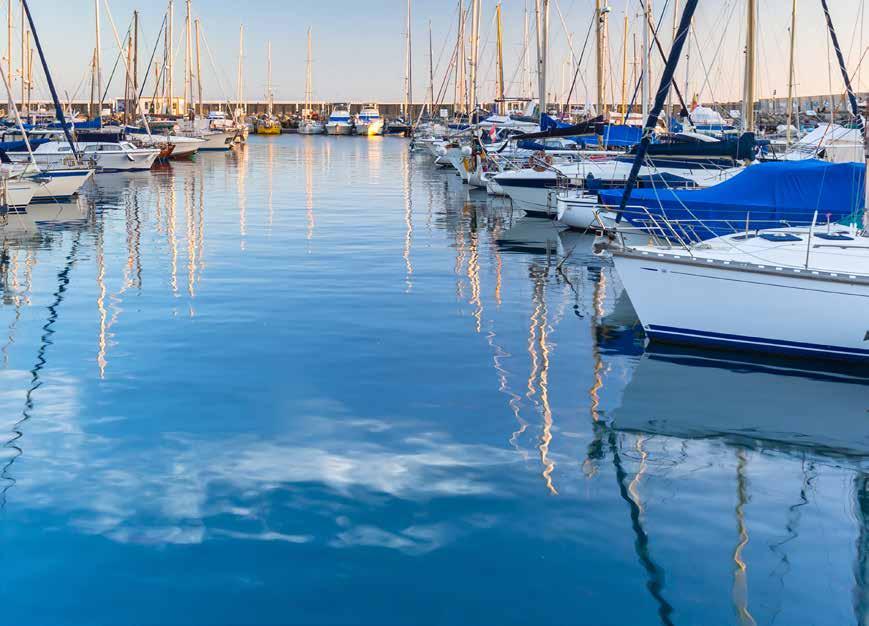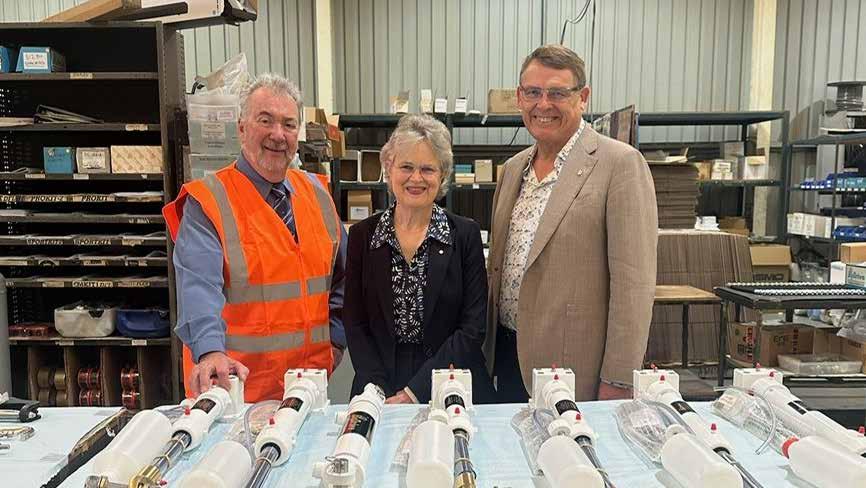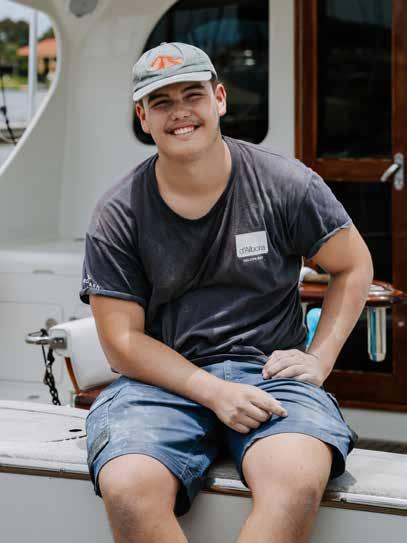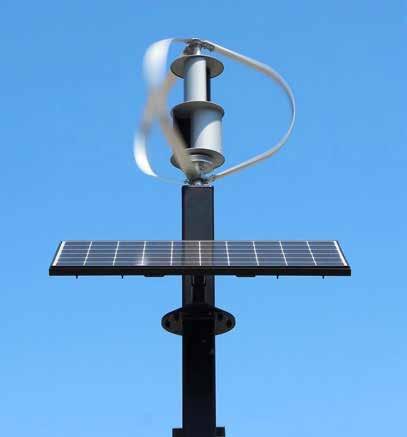
8 minute read
MARINE MECHANICS IN DEMAND
by Jeni Bone
Today’s technicians can be sure of a career brimming with innovation and opportunity.
Marine Mechanics have been identified as a top priority occupation on the national apprenticeship shortlist, reflecting a shortage of skilled tradespeople in this technical and evolving field.
Essential to vessel construction, refit and maintenance, Marine Mechanics are in high demand at every level of the boating industry due to a combination of factors.
Along with an aging workforce, this specific trade has declined because of waning investment in training and career pathways, and stiff competition from sectors such as commercial shipping, oil and gas industry, offshore wind farms, mining and automotive.
The trade once associated with “gears and grease” has embraced technological and cultural change, and expanded include knowledge of electric and alternative propulsion in an increasingly digital age.
Brad Zoelle, Outboard Engine Distributor Association (OEDA)
Chair and General Manager, Asia-Pacific Mercury Marine explains that the new generation of marine mechanics requires different skills to keep pace with technology.
“All products have become increasingly digital and it is important new marine mechanics are computer savvy. Diagnostic processes rely on understanding the complex electrical systems and how they integrate into other vessel systems.
“Marine Mechanics must be able use and understand the software that communicates with the multitude of electronic modules. We are seeing a continued shift to higher horsepower applications in outboards and this is also impacting the boats design and therefore, the marine technician workplace.”
According to Brad, “Marine Mechanics will see continued innovation in the coming years in the form of higher horsepower applications, progress in fuel emissions, electrification of propulsion and alternative fuels, as well as innovation on every other vessel system from displays to steering systems and more.”
Qualified technicians are in short supply across most industries, he continues, but the large proportion of small businesses in the marine industry may explain the shortfall in the sector.
“The marine landscape is filled with incredible small businesses that may not have the structures in place to support apprentices and training programs,” he said.
“We also face wage pressure and competition from other qualified technician jobs in mines and other industries and, unique to marine, we do face a more cyclical or seasonal nature to our business which can affect demand. The work environment is also important to attract qualified marine mechanics versus other industries, and the leading industry participants know this is a key part of attracting talent.”
Fortunately, OEDA, the BIA and partner organisations are collaborating on the foundations required to educate and train new technicians, and importantly to motivate newcomers to join a vibrant and thriving marine industry.

“The BIA and OEDA are committed to attracting new entrants into the industry,” Brad asserts. “Attracting new people into the trade starts with education and pairing that education with training programs and certification that meet the needs of the diverse group of businesses that make up the marine industry.”
At the customer interface, service centres around the country say there’s no quick fix for the skills shortage, which can often be attributed to the issue of retention.
Jon Hunt, owner at Hunts Marine Sydney and third generation in the business established in 1946, oversees three dealerships, each with a workshop and service centre: Sydney, Wollongong and Batemans Bay. Jon grew up boating and joined the business in 1994.
“Getting an apprentice is not the issue – over the years I have had a terrific run of some really good kids. The issue is retaining them and trying to offer some sort of career pathway. It’s hard, as most dealerships are small to medium sized family businesses and quite often the person next in line is the owner so there is not a lot of room to move.
“Of course, there are different challenges between the cities and regions. Generally, in the regions, the lifestyle is more affordable and there’s better work life balance.
“There’s work out there we could take on, but in the cities, we’re limited by space,” he says of the option to expand premises to take on more work.
The key is to have a flow of skilled young people coming through, says Jon, adding that it’s a positive step that TAFE and private colleges have prioritised marine trades.
Robert Cuming heads up Christies Beach Marine, south of Adelaide, and another independently run dealership in Victoria, Melbourne Marine Centre in Dandenong South.
Since 1992, Rob has grown Christies Beach Marine from sole operator to a team of 14. Rob grew up fishing and boating, and chose to pursue his pastime as a career, starting his apprenticeship as an Outboard Mechanic in 1986.
“We’ve probably had 18 apprentices since we started,” he said. “Attracting them hasn’t been the hardest part, it’s been keeping them. They often head off to the mines, change industries, or join bigger corporations. Only two or three have stayed in the industry.
“How do we address it? Keep trying to find the right people, motivate them and pay them well.”
Christies Beach Marine currently have two apprentices on their team and ideally, would like to take on one per year.
“There are really solid career paths as a Marine Mechanic – from apprenticeship to ownership,” says Rob. “We encourage them along that path. And they don’t need to be limited to the workshop. These days there are so many options, especially at the big boat end which opens up the world.
“And the motor is only one part; there’s a lot of digital technology and electrical systems, and increasingly, advances in alternative fuels and electric, similar to the automotive industry.”
Nic Kitchen, director of Seatech Marine, which has serviced, repaired and repowered boats since 1988, is in a unique position to comment on the current landscape from a trade perspective as well as from the vantage point of his role on the Board of the BIA.
“Before buying the business three years ago, I was National Manager for Yamaha, and before that, with Mercury,” he says.
“I have seen the changes in the industry and the role of Marine Mechanics. There’s a lot more interaction with customers and more technology in terms of smart systems, electric and hybrid propulsion.
“There’s a lot of variety. You get to work on a different vessel every day and compared with automotive, it’s better for your back!”
The main challenges as a business operator are attracting talented people and keeping them. “The Gold Coast is Australia’s main marine hub with the country’s biggest concentration of marine businesses, and it can be quite competitive. We have 10 people on staff now and I could use three more. There’s an abundance of work and we could grow further, but we’re limited by our ability to bring people on.”
The BIA’s focus on careers expos and ties with schools, and training institutions has proven productive, Nic attests.
“The BIA has secured major funding from the Queensland government which will ‘turbo charge’ the Marine Jobs platform in the Sunshine State, careers events and information sessions we host to introduce people to the diverse opportunities in the industry.”
Following its National Jobs & Skills Annual Survey in 2025 which revealed 93 percent of marine businesses are concerned about skilled labour with 85 percent concerned about the shortage of apprentices and more than 45 percent reporting a consequent loss of revenue, the BIA has prioritised training and education and implementing a concerted education campaign to inform school students and experienced tradespeople seeking a career change.
Maria Hobbs is Business Development Officer for Marine Jobs, an initiative the BIA is delivering for the wider marine industry with the mission to attract, train and retain a skilled workforce for Australia’s wider domestic marine industry.
Marine Jobs is a multi-faceted program comprise of online jobs platform, marketing, advertising, events, advocacy to State and Federal governments and direct engagements with RTO and schools.
At the 2025 Sydney Boat Show, 14 to 17 August at the Sydney Showground, the BIA welcomed 400 students from 14 schools over two days to learn about the opportunities in marine trades, superyachts, marine rescue and marine safety.


During a panel discussion, 2024 Apprentice of the Year, Michaela Douglas shared her own experience entering the industry as a Marine Mechanic. In addition to the satisfaction of the work, Michaela elaborated on the many benefits apprentices may be eligible for, such as interest-free loans for tuition and tools, travel allowances and rebates on car registration.
BIA supports and delivers such events to showcase the career opportunities in jobs and skills across the marine industry.
In Queensland, the BIA has forged strong bonds with The Industry School which operates six campuses: Brisbane, Redlands, Ipswich, Toowoomba, Sunshine Coast and Gold Coast, with plans to open in Melbourne in 2027 and North Queensland in the next few years.
The Industry School hails its system as “deliberately different” and caters to students in Years 10 to 12 with a program that immerses them in the industry of their choice – spanning trades from Aircraft Maintenance and Arborist to Watchmaker and Wood Machining. The marine industry is represented in Marine Cabinetry, Marine Craft Construction and Marine Mechanic.
Travis Templar from The Industry School says their approach works, and its 80 percent success rate stands as testament to its success.
“In Years 10 and 11 they can try before they commit, then at the end of Year 11, they make their choice and see out their apprenticeships.
“Our young people are pre-qualified. They undertake work experience for weeks at a time, unpaid and insured by us.
“When they finish Year 12, they’re one year into their apprenticeship, and fully qualified by the time they’re 20, earning decent money.”
The Industry School and BIA host information events and open nights for prospective students and their families, working closely with industry partners such as CHAPMAN, Maritimo, Riviera, SD Marine, Aus Ships and Norman R. Wright & Sons.
To keep pace with technology and the quest for more sustainable systems, courses are regularly updated to cover innovations in propulsion. There is also the option to undertake a dual qualification trade, which involves five years and covers Mechanical and Electrical, resulting in two Cert 3 qualifications.

“We’re proud of having a finger on the pulse,” comments Travis. “We’re very lucky that a lot of companies accepts our students for work experience. It’s great for students and their families to see the modern work environment and in some cases, they go on to take up apprenticeships with them.
“The future looks bright,” he adds. “The model works and the demand is there for more schools.”
Among the initiatives rolling out in 2025 is a week-long Marine Trades Taster pilot program at Coomera TAFE for students from Men of Business Academy, aimed at giving young people t start in the industry at entry level.
The five-day program exposes students to basic skills including Marine Diesel engine science and Boat Building/Marine Craft Construction including fibre glassing, gel coats and use of moulds. The program is capped off by students completing their BIA Marine Card, thus ensuring they are industry ready.
This high-profile project aims to prove that a Marine Ready program can be delivered and employers can recruit from this pool. It is anticipated that this program will be extended and offered to other entities, regions, and stakeholders during 2026.
The key is not only to provide information on careers in our industry but to provide students, industry, schools, educators and parents with education on clear pathways – whether this be VET based training and education, apprenticeships and traineeships or tertiary qualifications.
Perhaps the last word goes to, Brad Zoelle who points out that marine jobs are many and varied.
“The marine industry is an incredible place filled with people who are passionate about the lifestyle, connection to water and the diversity of work it offers. As young men and women, or experienced older people who are looking to change careers, the marine industry is an easy one to connect with and get passionate about even if have no prior experience with boating,” he said.







